Abstract
More than a 1,000 delegates from 40 countries participated in the 15th WONCA World Rural Health Conference held at India Habitat Centre, New Delhi, from 26-29th April, 2018. The theme of this conference was “Healing the Heart of Healthcare - Leaving no one behind”. The conference was organized by the Academy of Family Physicians of India in association with WoRSA - WONCA Rural South Asia. WONCA is the World Organization of Family Doctors. The conference aspired to bring rural healthcare on global agenda. SDG 3 though focuses on healthcare; however rural healthcare hasn’t been emphasized enough. The conference was formally endorsed by the National Health Mission (NHM) under Ministry of Health and Family Welfare (MOHFW) and the Niti Ayog – the National Policy Commission under Government of India. An extensive scientific program with 13 keynote speakers, 250 oral presentations, 85 e-posters, 60 workshops, 26 Ideathon presentations, 20 panel discussions and 10 symposiums spread over 8 parallel meeting rooms, ran over 4 days, kept the delegates engaged throughout. A national consultation on strengthening rural health care witnessed rural health experts from across the world deliberating on rural health challenges and solutions. Niti Ayog – the policy commission the highest policy making body in India cohosted a national consultation on strengthening rural healthcare in India, during this conference. The conference brought together stakeholders of rural health and primary health care, to address current and future challenges in rural health. The conference culminated with the unanimous adoption of the Delhi Declaration, calling for people living in rural and isolated parts of the country to be given special priority if nations are to achieve universal health coverage. The Declaration identifies six areas as priorities to achieve “Health For All Rural People”: equity and access to care, rural proofing of policy, health system development, developing and educating a workforce fit for purpose, realigning the research and people and communities. Delhi declaration was also featured acknowledged by the World Health Organization at its website as an positive outcome.
Keywords: Academy of Family Physicians of India, Delhi Declaration, National Consultation on Rural Health, National Health Mission, Niti Ayog, Rural Healthcare, World Health Organisation
Introduction
More than a 1,000 delegates from 40 countries participated in the 15th WONCA world rural health conference held at India Habitat Centre, New Delhi from 26-29th April, 2018. Theme of this conference was “Healing the heart of Healthcare - Leaving No one behind”. The conference was organized by the Academy of Family Physicians of India in association with WoRSA - WONCA Rural South Asia. WONCA is the World Organization of Family Doctors. The conference aspired to bring rural healthcare on global agenda. SDG 3 though focuses on healthcare; however rural healthcare hasn’t been emphasized enough. The conference was formally endorsed by the National Health Mission (NHM) under Ministry of Health and Family Welfare (MOHFW) and the Niti Ayog – the National Policy Commission under Government of India. More than thousand delegates (1044) from more than 40 countries participated in this academic event.
Inaugural ceremony
Honorable Vice President of India Mr M Venkaiah Naidu inaugurated the conference. He highlighted the importance of family doctors and need to improve rural health care. The vice president of India, also the chairman of the upper house of the parliament, in his inaugural speech, said, “There is a need to promote the concept of family doctor in a big way. A family doctor provides primary and continued care to the entire family within the communities; addresses physical, psychological and social problems; and coordinates comprehensive healthcare services with other specialists, as needed, Family physicians deliver a range of acute, chronic and preventive medical care services. Honorable Minister for Health and Family Welfare, Government of India, Mr Ashwini Kumar Choubey, graced the occasion as guest of honor. The Mission Direction of National Health Mission (NHM), Government of India, Mr Manoj Jhalani, delivered the inaugural keynote address. NHM, Ministry of Health and Family Welfare, Government of India, officially supported this event. The Vice President of India, Mr M Venkaiah Naidu, awarded many healthcare workers including nurses, paramedics, health educators and ASHA workers during the inaugural ceremony for their exemplary work in the public sector[1] Figures 1–3.
Figure 1.
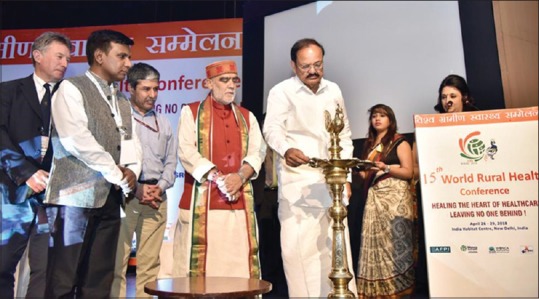
Lighting of Lamp: Inauguration (Standing from left to right – Prof John Wynn Jones- Chair WONCA Rural, Dr Raman Kumar - Organizing Chairperson, Mr Majoj Jhalani Mission Director -National Health Mission, Mr Ashwani Chaubey – Minister of State for Ministry of Health and Family Welfare, Mr M Venkaiah Naidu – Honorable Vice President of India)
Figure 3.
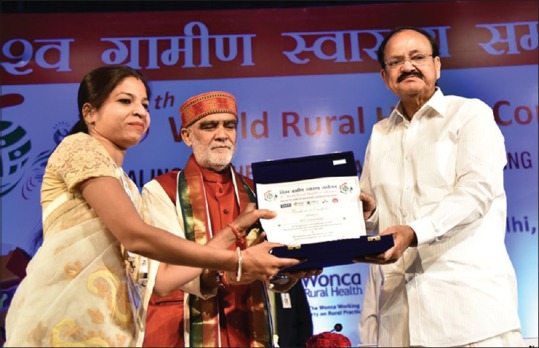
Award to ASHA and Nurses – Community Health Workers
Figure 2.
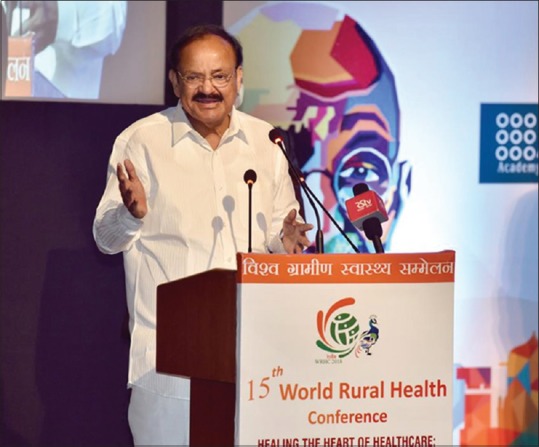
Inaugural Speech by Mr M Venkaiah Naidu Honorable Vice President of India and Chairman of ‘Rajyasabha’ the upper house of the Indian Parliament
Message from the Prime Minister of India
The Prime Minister of India, Mr Narendra Modi, sent an auspices message to the conference participants and emphasized upon the importance of rural health. In his message, he said, “Rural healthcare is one key sector which our government has focused for holistic transformation to ensure the goal of ‘Healthcare for all’”. In India, the event turned out to be excellent platform for policy makers, rural practitioners, public health professional, medical students, healthcare teams and grassroots workers to discuss and deliberate upon the challenges of meeting the healthcare needs of rural population. Various state governments of India sent their representatives, officers and medical doctors for participating in this conference [Figure 4].
Figure 4.
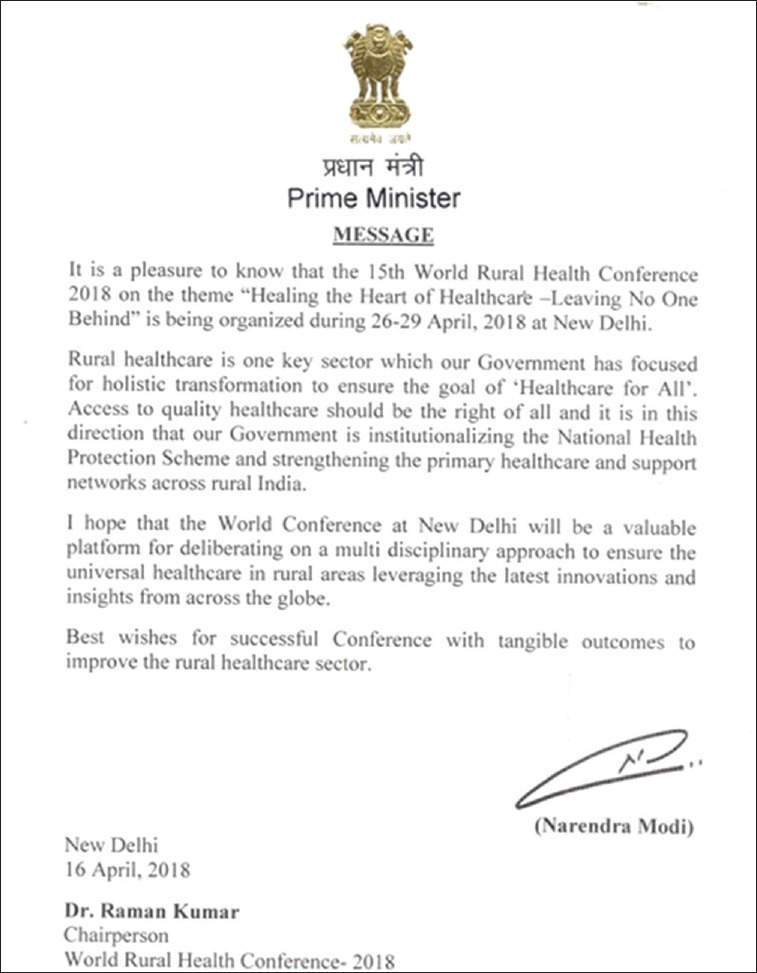
Message from the Honorable Prime Minister of India
Conference headlights and scientific program
More than thousand delegates (1044) from more than 40 countries participated in this conference. An extensive scientific program with 13 keynote speakers, 250 oral presentations, 85 e-posters, 60 workshops, 26 Ideathon presentations, 20 panel discussions and 10 symposiums spread over 8 parallel meeting rooms, ran over 4 days, kept the delegates engaged throughout. The delegates included family physicians, general practitioners, medical officers, primary care doctors, rural doctors and other rural healthcare professionals, NHM (National Health Mission) doctors and professionals, public health professionals, international development professionals, nursing professionals and allied health workers, family medicine trainees/residents (MD/DNB Family Medicine), medical students and post graduate aspirants, rural medical officers and surgeons, medical officers in public sector, specialist doctors with primary care interest, AYUSH professionals, NGO (Non-Government Organization) representatives, policy makers and health administrators, healthcare managers, healthcare policy makers, civil Servants, citizen with interest in health care, patient support groups, consumer right groups and media professionals. Prof John Wynn-Jones delivered the annual John Macleod Oration.
Rural Health Ideathon with an interesting format attracted many medical students, whose enthusiastic participation was one of the main highlights of this conference. Indian Institute of Technology (IIT) Guwahati partnered for Ideathon at WRHC 2018. This was first ever World Rural Health Conference organized in South Asia. Incidentally, a quarter of human population, majority of which is based in rural habitat, lives in South Asia. Delegates and guests started arriving before the event. Many delegates took advantage of pre- and post-conference exchanges “Sojourn” and visited various parts of India and closely observed healthcare delivery in rural and remote areas. Rajasthan and Kerala states of India were popular destinations.[2]
The WONCA Rural Council met on 25th April 2018 during a pre-conference meeting and deliberated upon Delhi Declaration. The Pre conference meeting was attended by WONCA rural executives and invited guests. The conference began on 26th April 2018 with rural health assembly, which was well attended and appreciated for its wide range of interesting topics. Representatives of rural healthcare providers from various regions of the world presented their respective perspectives [Figures 5–10].
Figure 5.
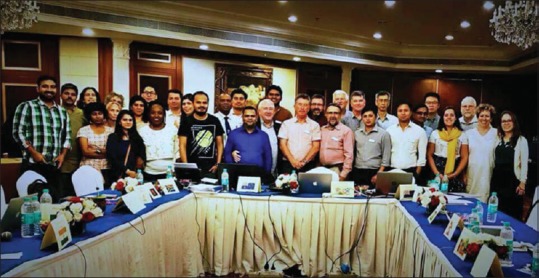
WONCA Rural Council Meeting
Figure 10.
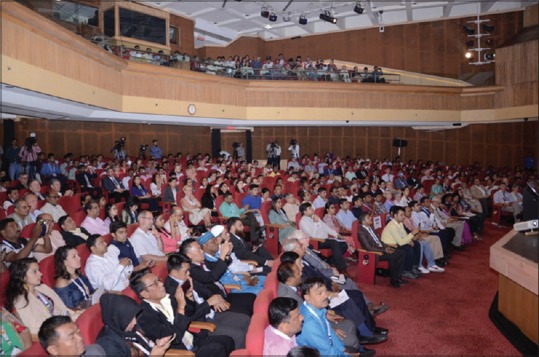
Full house – delegates from forty countries
Figure 6.
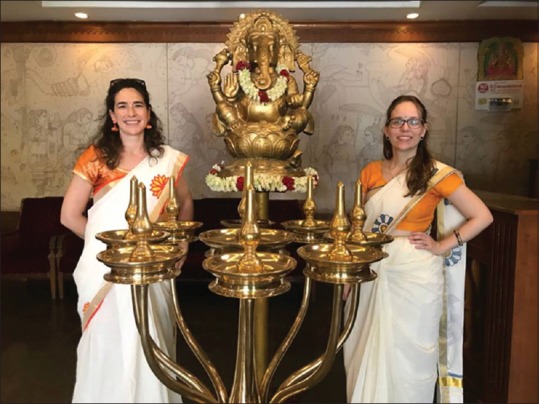
Sojourn – Rural Health Visits Kerala India (Delegates from Spain and Brazil)
Figure 7.
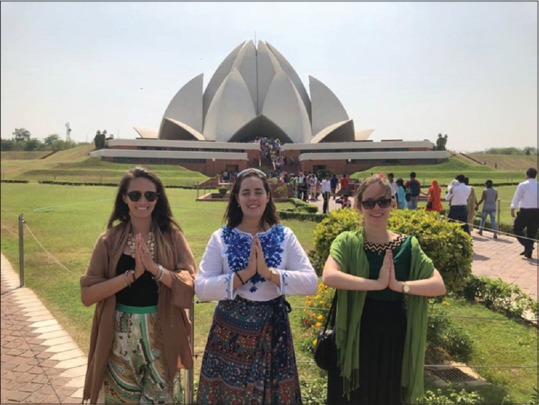
Local sight Seeing Delhi (Brazilian delegates)
Figure 8.
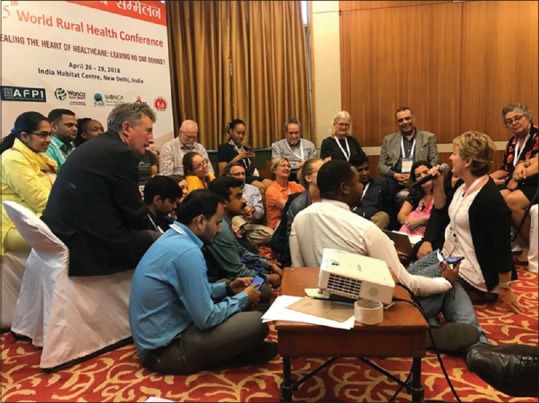
Rural Café for students and young doctors
Figure 9.
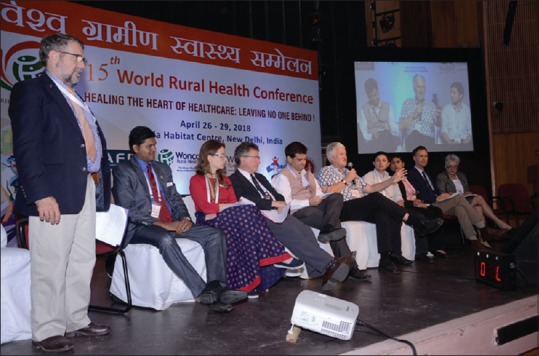
Rural Health Assembly
FISFA: International Short Film and Arts Festival
The inaugural edition of FISFA – International Short Film and Arts Festival held in association with the 15th World Rural Health Conference at India Habitat Centre, New Delhi, saw a conglomeration of film/media professionals, student/amateur film makers and doctors/medicos showcasing their films broadly themed on healthcare issues. As many as 76 short films on the broad theme of rural health, poverty, good health and wellbeing, nutrition, health education, gender equality, climate action, clean water and sanitation, mental health, human relationships, sexual health, mother and child health, digital health, adolescent health, peace, justice and health innovation were submitted through the website. 42 high quality films short listed by the committee were screened at the festival. The films were categorized as animations, documentaries, fictions, student films and experimental short films in 12 languages from United States, India, England, Portugal, Brazil, Japan, Malaysia, Bangladesh, Australia, and South Africa [Figures 11–13].
Figure 11.
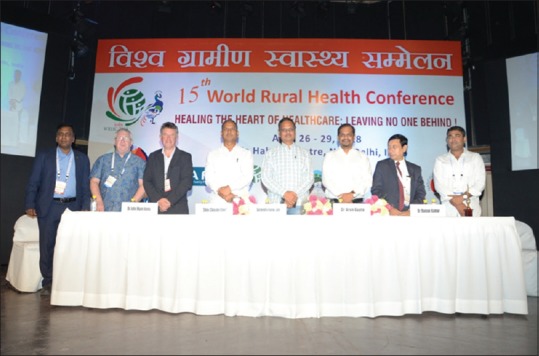
Healthcare Leadership and FISFA Award Ceremoney From left ro right Dr Raman Kumar Organizing Chairperson, Dr Garth Manning – CEO WONCA, Prof John Wynn Jones – Chair WONCA Rural, Mr Shiv Charan Goel Member of Legislative Assembly Delhi, Mr Satendra Jain Honorable Health Minister of Delhi, Prof Kanu Bala – President WONCA SAR, Mr Sagar Ballary – Film director)
Figure 13.
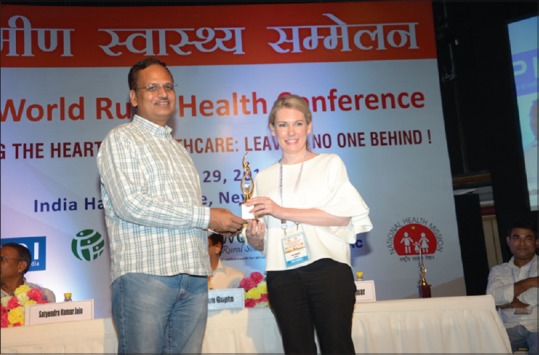
FISFA – Short Film Festival Award
Figure 12.
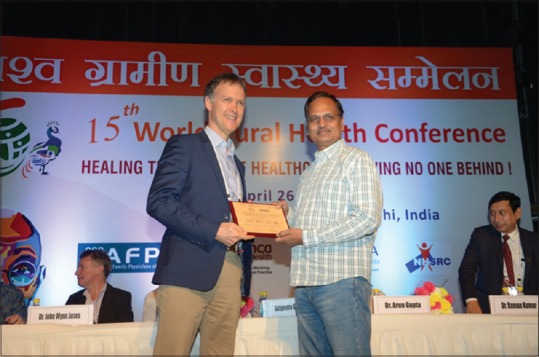
Healthcare leadership award to Prof Paul Worley Rural Health Commissioner of Australia
Healthcare leadership awards
The Health Minister of the Government of National Capital Territory (GNCT) of Delhi, Mr Satendra Jain, graced the healthcare leadership award ceremony on 27th April 2018. Awards were presented to distinguished health care leaders for their exemplary service in rural areas. The honorable minister was pleasantly surprised to attend the health conference which was hosted in such a big way without the assistance of any pharma sponsor. He also appreciated the role of family doctors in the society [Figure 14].
Figure 14.
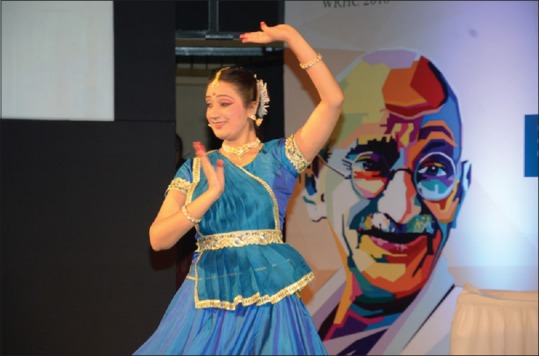
WRHC 2018 Cultural Evening
Student participation, rural café and cultural events
One of the major highlight was how the medical students participated in this conference in a big way. Medical Student Association of India (MSAI)/IFMSA and JDN (Junior Doctor Network) of Indian medical association not only actively participated by also took important roles in organizing this conference. Members of Rural Seeds organized a popular “rural café” during WRHC 2018 which was streamed live. The cultural events of WRHC 2018 truly captured the essence of India and helped delegates relax and enjoy Indian culture and cuisine. Students and artists from University of Delhi contributed to the cultural evening [Figure 14].
Media coverage
The conference was covered widely by the mainstream media. The inaugural ceremony was telecasted live by the Rajya Sabha TV, the official TV channel of the upper house of the Parliament of India. (https://www.youtube.com/watch?v = 0uUQS2Ye1hk)
No pharmaceutical sponsorship
WRHC 2018 was successfully conducted without any support or sponsorship from pharmaceutical industry. This was possible due to enthusiastic participation of delegates from all over world who crowd-funded this whole event through the registration fee. Therefore we are extremely grateful to all participating delegates, members of WONCA family from all across world for coming down to Delhi and making this conference a great success.
National Consultation of strengthening rural healthcare: Cohosted by NITI Ayog
A national consultation on strengthening rural health care witnessed rural health experts from across the world deliberating on rural health challenges and solutions. Organized in association with the Basic Healthcare Services Trust, Niti Ayog – The policy commission the highest policy-making body in India cohosted a national consultation on strengthening rural healthcare in India, during this conference. Experts and officials from WHO India – SEARO Office, Ministry of Health and Family Welfare, Representatives of various state governments, functionaries of NGOs and development professionals participated in this consultation. Report and recommendations of the consultation were later released on 15th August 2018 on India's Independence Day[3] [Figures 15 and 16].
Figure 15.
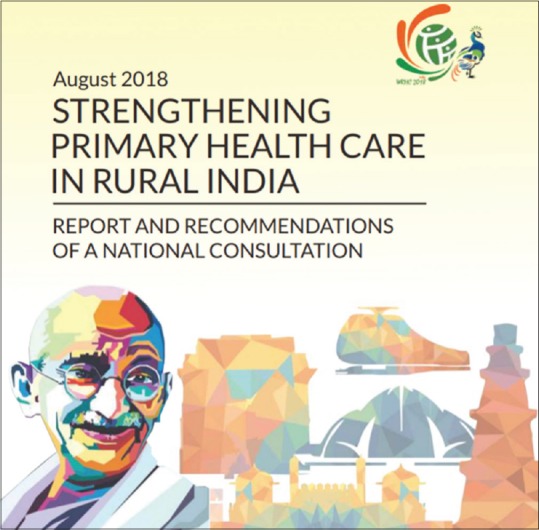
Cover of the Report and Recommendations of a National Consultation
Figure 16.
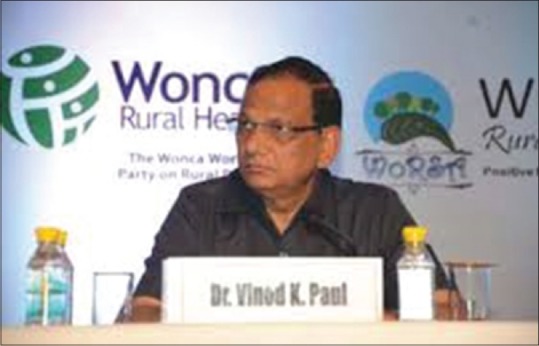
Dr Vinod K Paul: Member Niti Ayog speaking at the national consultation on rural health
Delhi Declaration: Featured by the World Health Organization – Impact of WRHC Delhi
During the closing ceremony, the Delhi Declaration was adopted which revisited Alma Ata Declaration with the aim to achieve a highest possible level of health for the communities we serve, with the goal of “Health For All Rural People.” (http://www.globalfamilydoctor.com/delhideclaration). This conference would be remembered for it participation by top policy makers, key stake holders, important health institutions, various medical universities, high turnout of medical students from all across world. Core rural health issues were well highlighted and correct message was sent across. We hope that the conference was successful in its aspirations. The Delhi Declaration 2018was featured by WHO at its website with following citation - The 15th WONCA World Rural Health Conference, under the theme ‘Healing the Heart of Healthcare: Leaving No One Behind’ brought together stakeholders of rural health and primary health care, to address current and future challenges in rural health. The conference culminated with the unanimous adoption of the Delhi Declaration, calling for people living in rural and isolated parts of the country to be given special priority, if nations are to achieve universal health coverage. The Declaration identifies six areas as priorities to achieve “Health For All Rural People”: equity and access to care, rural proofing of policy, health system development, developing and educating a workforce fit for purpose, realigning the research and people and communities.[4,5]
References
- 1.Address by Shri M Venkaiah Naidu, Honourable Vice President of India at the 15th World Rural Health Conference with the theme Healing the Heart of Healthcare – Leaving no one behind, in New Delhi on 26th April 2018. [Last accessed on 2019 Oct 10]. Available from: https://vicepresidentofindia.nic.in/speechesinterviews/address-shri-m-venkaiah-naidu-honourable-vice-presidentindia-15th-world-rural .
- 2.Rural Round Up: Delhi WONCA Rural Health Conference Report. [Last accessed on 2019 Oct 10]. Available from: https://www.globalfamilydoctor.com/News/RuralRoundUpDelhiWONCARuralconferencereport.aspx .
- 3.Strengthening primary healthcare in rural India: Report and recommendations of a national consultation. 2018. Aug, [Last accessed on 2019 Oct 10]. Available from https://www.indembassyisrael.gov.in/pdf/Rural_Primary_Care_Report_Sep05.pdf .
- 4.Kumar R. The Delhi declaration 2018: “Healthcare for all rural people” – Alma Ata revisited. J Family Med Prim Care. 2018;7:649–51. doi: 10.4103/jfmpc.jfmpc_217_18. [DOI] [PMC free article] [PubMed] [Google Scholar]
- 5.WHO. The Delhi Declaration. [Last accessed on 2019 Oct 10]. Available from: http://www.who.int/hrh/news/2018/delhi_ declaration/en/


